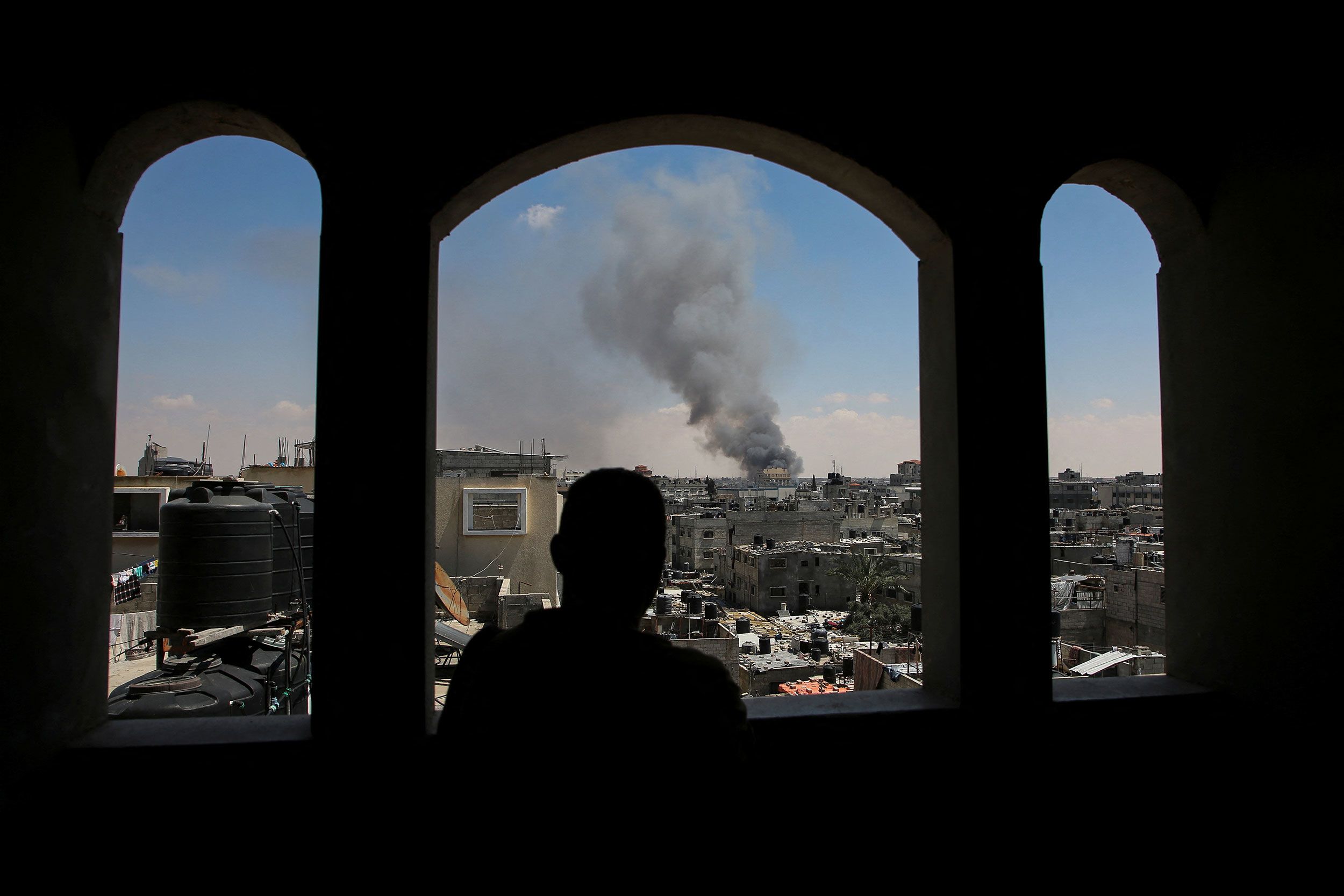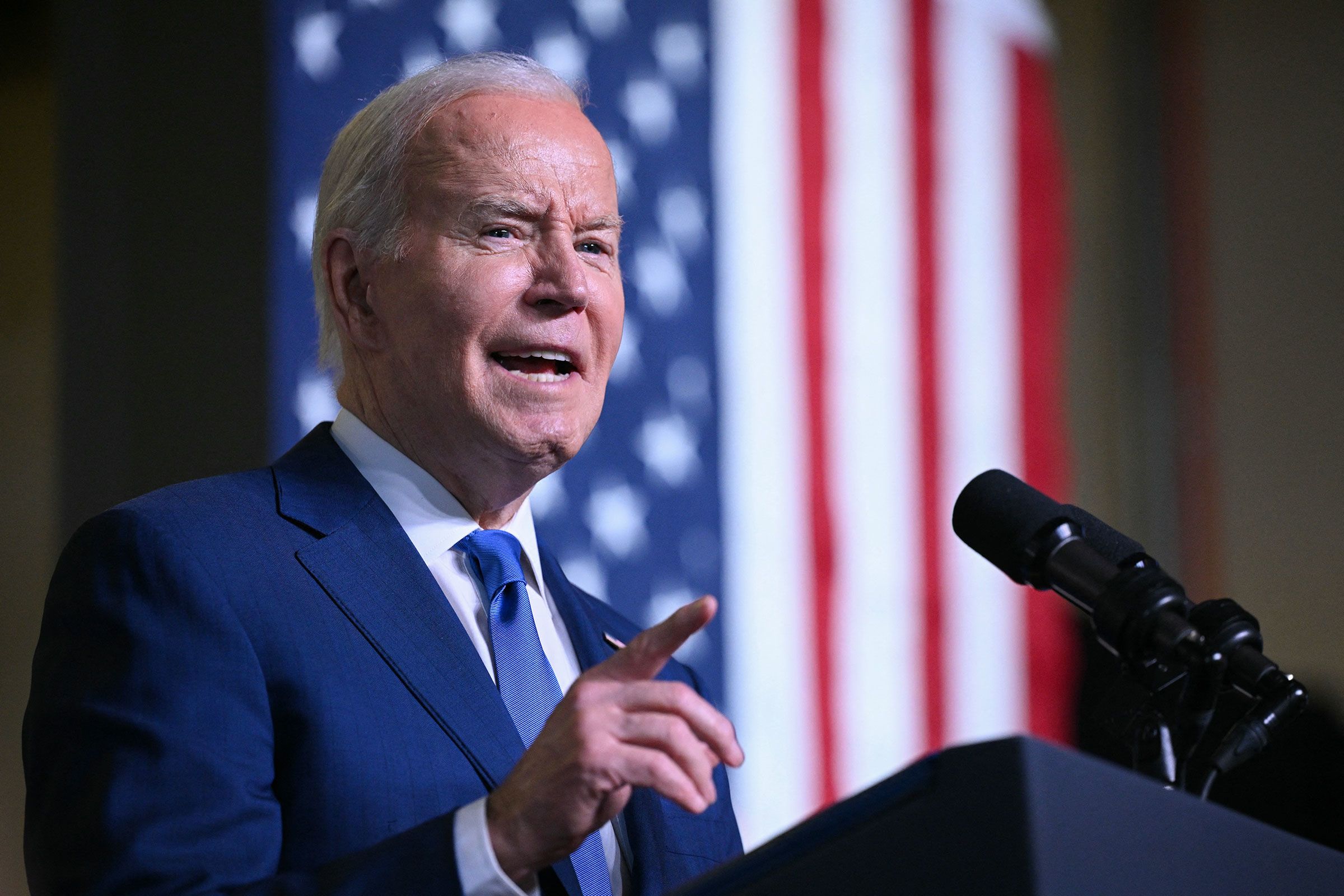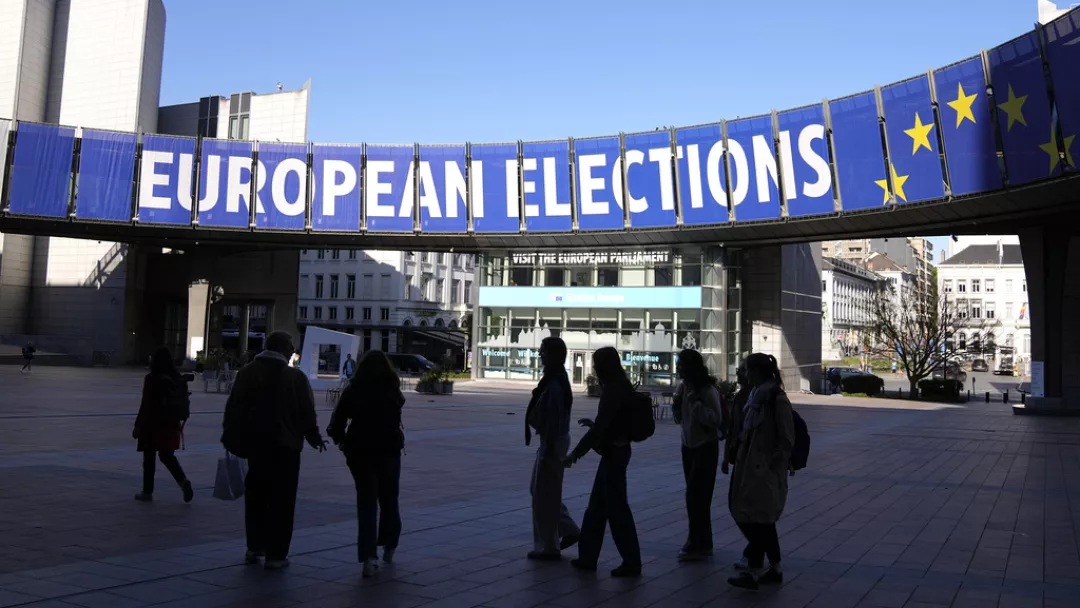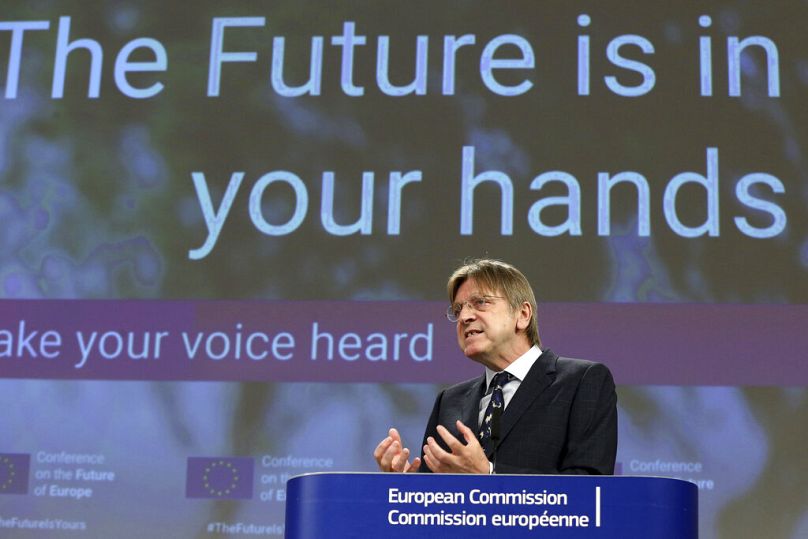
“حماس تحبه”.. وزراء إسرائيليون يهاجمون بايدن وزعيم المعارضة يطالب بوقف الحرب
انتقد مسؤولون إسرائيليون تهديد الرئيس الأميركي جو بايدن بوقف تسليح إسرائيل إذا اجتاحت مدينة رفح جنوب قطاع غزة، في المقابل دعا زعيم المعارضة الإسرائيلي يائير لبيد للتوصل إلى صفقة تبادل ووقف الحرب.
وفي تطور لافت، حذر بايدن أمس الأربعاء إسرائيل علنا للمرة الأولى من أن واشنطن ستتوقف عن إمدادها بالأسلحة إذا اجتاحت مدينة رفح. وأقرّ الرئيس الأميركي للمرة الأولى بأن القنابل التي زودت بها بلاده إسرائيل استُخدمت في قتل مدنيين فلسطينيين.
وفي أول رد فعل رسمي إسرائيلي على تصريحات بايدن، نقلت الإذاعة الإسرائيلية عن السفير الإسرائيلي لدى الأمم المتحدة جلعاد أردان وصفه الموقف الأميركي بالصعب والمحبط والمخيب للآمال.
وأضاف أردان أن من شأن الموقف الأميركي منع إسرائيل من تحقيق هدفها الأساسي للحرب وهو إسقاط حركة المقاومة الإسلامية (حماس)، ومنح أعداء إسرائيل الأمل بالنجاة، على حد تعبيره.
بدوره، رد وزير الأمن القومي الإسرائيلي إيتمار بن غفير على تصريح الرئيس الأميركي في حسابه على منصة إكس بأن حماس تحب بايدن.
وعلّق الرئيس الإسرائيلي إسحاق هرتسوغ على تغريدة بن غفير، قائلا إنه “يجب تجنب التصريحات غير المسؤولة والمهينة والتي لا أساس لها”.
في حين قال وزير الطاقة إيلي كوهين للصحيفة ذاتها، معلقا على القرار الأميركي إن “الاستقلال في إنتاج الأسلحة والذخيرة أمر بالغ الأهمية لأمن إسرائيل”.
وأضاف كوهين، الذي شغل سابقا منصب وزير الخارجية: لسنا بحاجة إلى الانتظار حتى نهاية الحرب، يجب أن نتحرك على الفور لإنشاء أنظمة إنتاج في الشركات القائمة، وإنشاء شركات دفاع جديدة لإنتاج الأسلحة والذخيرة.
من جانبها، نقلت صحيفة “إسرائيل اليوم” عن أحد المسؤولين قوله إنه يجب احتلال رفح كي تظهر للعالم أن إسرائيل ليست “محمية أميركية”.
إحباط إسرائيلي
وفي الأثناء، نقل موقع أكسيوس عن مصدرين مطلعين أن مسؤولين إسرائيليين كبارا حذروا نظراءهم الأميركيين من أن قرار تعليق شحنات أسلحة إلى إسرائيل قد يقوض مفاوضات الرهائن. وذكر الموقع أن المسؤولين الإسرائيليين أبلغوا إدارة بايدن أنها بحاجة للضغط على حماس لا على إسرائيل.
كما نقل الموقع أن مسؤولين إسرائيليين أعربوا لمسؤولين أميركيين عن إحباطهم ليس بسبب تعليق شحنة الأسلحة وحسب، بل لتسريب الأمر إلى وسائل الإعلام أيضا.
هذا ونقلت القناة 12 الإسرائيلية عن مسؤول إسرائيلي كبير أن الجيش الإسرائيلي سيدخل رفح في جميع الأحوال، وأن لدى إسرائيل الوسائل الكافية لفعل ذلك بدون مساعدات.
في حين أعلنت هيئة البث الإسرائيلية أن المناقشات بين كبار المسؤولين الإسرائيليين والحكومة الأميركية بشأن عملية عسكرية محتملة في رفح، توقفت منذ 3 أسابيع، كما لم يتم تحديد أي موعد لإجراء مزيد من المناقشات.
وأضافت هيئة البث الإسرائيلية نقلا عن مسؤولين أنه من المستحيل بدء الجزء العسكري من العملية داخل رفح، بدون مناقشات مع الأميركيين.
ويأتي ذلك، في وقت ذكرت فيه إذاعة جيش الاحتلال أن إسرائيل لن تتمكن من تجاهل تهديد بايدن بوقف إمدادها بالذخيرة إن بدأت عملية واسعة برفح، مؤكدة أن العملية الواسعة في رفح تم وقفها حتى الآن، معتبرة أن بايدن أضر بمكانة إسرائيل في المفاوضات عندما جردها من عامل الضغط العسكري الكبير الذي لديها.
وقف الحرب
في المقابل، قال زعيم المعارضة الإسرائيلية يائير لبيد إن إسرائيل بحاجة إلى صفقة ويجب استنفاد التحرك في القاهرة لإعادة المختطفين إلى الوطن، حسب قوله. ورأى أن تهديد الرئيس الأميركي جو بايدن بمنع تزويد إسرائيل بالأسلحة هو نتيجة للإدارة الفاشلة لحكومة بنيامين نتنياهو.
وأضاف لبيد أنه عرض على نتنياهو ما سماها “شبكة أمان”، لافتا إلى أن رئيس الحكومة لم يقم بالصفقة لأنه مسجون من قبل هؤلاء المجانين وزير الأمن الإسرائيلي إيتمار بن غفير ووزير المالية الإسرائيلي بتسلئيل سموتريتش، حسب وصفه.
وتابع أنه لو لم يكن الوزيران بمجلس الحرب الإسرائيلي بيني غانتس وغادي آيزنكوت في الحكومة لكانت إسرائيل تجاوزت عهد نتنياهو وبن غفير وسموتريتش.
وفي منشور على حسابه على منصة إكس كتب لبيد أن العنف تجاه عائلات المختطفين أمر لا يغتفر ويجب على الشرطة احتواء احتجاجات العائلات وآلامها. وأردف قائلا: “بدلا من إرسال الشرطة لضرب عائلات المختطفين يجب على الحكومة أن تفعل كل شيء لإعادة أبنائهم”.
وضع معقد
من جهته، رفض الرئيس السابق للإنتاج والمشتريات الدفاعية الإسرائيلي الادعاء بأن إسرائيل تستطيع التعامل مع ما وصفه بـ”التهديدات” بدون أسلحة أميركية، قائلا إن إسرائيل ستكون مضطرة للحصول على أسلحة من مكان آخر.
ونقلت صحيفة هآرتس عن مسؤولين إسرائيليين قولهم إنه يجب على تل أبيب الاستماع للتحذيرات الأميركية، وإلا ستجد نفسها أمام وضع معقد، وفق تعبيره. وذكرت الصحيفة نقلا عن المسؤولين أن وقف المساعدات العسكرية الأميركية لتل أبيب سينعكس سلبا عليها إذا اندلعت حرب في جبهات أخرى.
شحنات أسلحة
وقبل يومين، قال مسؤول أميركي إن الولايات المتّحدة علقت الأسبوع الماضي إرسال شحنة قنابل إلى إسرائيل بعدما فشلت في معالجة “مخاوف” واشنطن إزاء خطط جيش الاحتلال الإسرائيلي لاجتياح رفح.
وقال المسؤول: “لقد علقنا الأسبوع الماضي إرسال شحنة واحدة من الأسلحة قوامها 1800 قنبلة، تزن الواحدة منها ألفي رطل (907 كيلوغرامات)، و1700 قنبلة تزن الواحدة منها 500 رطل (226 كيلوغراما)”.
بدورها، نشرت صحيفة “نيويورك تايمز” تقريرا لمؤسسة “الدفاع عن الديمقراطيات”، أكد أنه منذ هجوم طوفان الأٌقصى في السابع من أكتوبر/تشرين الأول أرسلت أميركا الكثير من شحنات الأسلحة إلى إسرائيل لدرجة أن مسؤولا كبيرا في وزارة الدفاع الأميركية (البنتاغون) قال إن واشنطن تكافح أحيانا للعثور على طائرات شحن كافية لتسليمها.
ونقلت الصحيفة عن المتحدث باسم البنتاغون، أن الولايات المتحدة زادت مليارات الدولارات من المساعدات الأمنية لإسرائيل، كما سمحت لها بالوصول إلى المخزونات العسكرية الأميركية في إسرائيل لتلبية الاحتياجات الفورية.
وأضاف المتحدث أن الذخائر التي طلبتها إسرائيل مؤخرا من تلك المخزونات شملت قنابل تتراوح بين 250 وألفي رطل و العديد منها كانت قنابل زنة 500 رطل.
ومنذ السابع من أكتوبر/تشرين الأول الماضي، تشن إسرائيل حربا على غزة خلّفت أكثر من 113 ألفا بين شهيد وجريح، معظمهم أطفال ونساء، وحوالي 10 آلاف مفقود وسط دمار هائل ومجاعة أودت بحياة أطفال ومسنين.
المصدر : الجزيرة + وكالات








